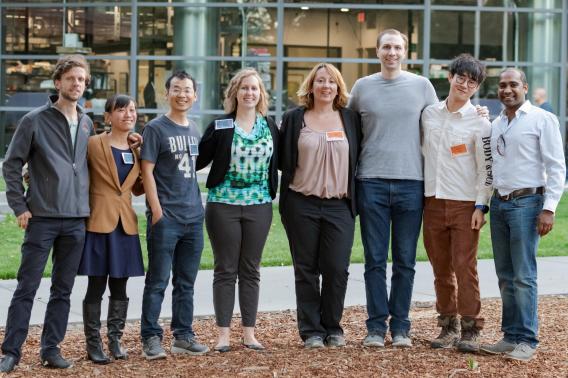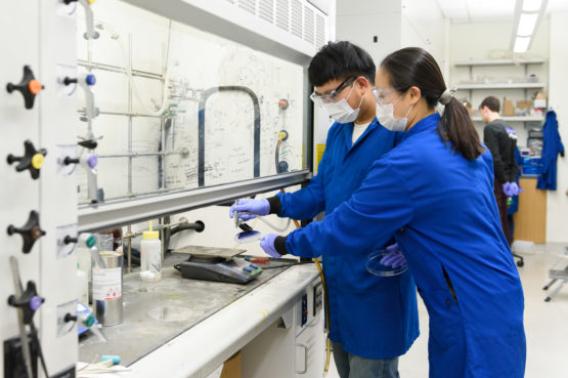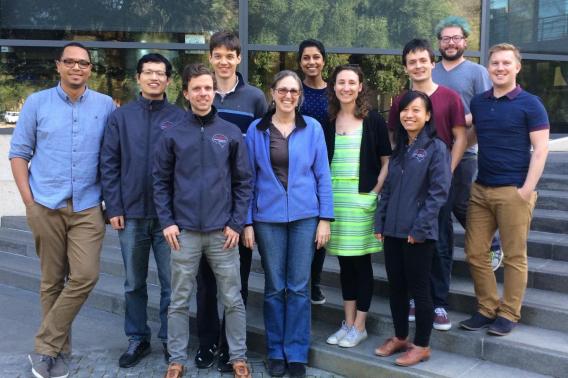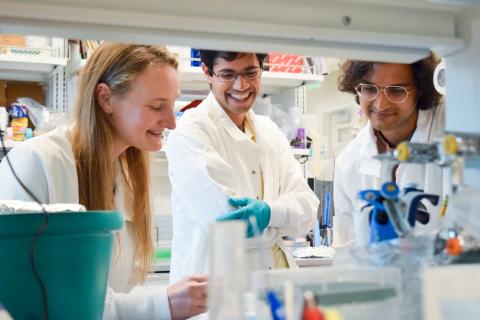Our postdoctoral scholars program provides research support and a community of mentors and peers to extraordinary Stanford postdocs advancing our understanding of the mind and brain in health and disease.
The Wu Tsai Neurosciences Institute's Postdoctoral Scholar Awards support innovative, collaborative and creative postdoctoral researchers from across Stanford who are pursuing novel, multi-disciplinary approaches to understanding the workings of the mind and brain. In addition to receiving research funding, scholars meet regularly for workshops, journal clubs and other activities that allow them to learn from one another’s varied research and personal backgrounds and establish community and collaborations. These Interdisciplinary and Brain Resilience Scholars will advance our knowledge of brain health and aging.
Program Tracks
Interdisciplinary Postdoctoral Scholar Award
Since 2015, the Wu Tsai Neuro's Interdisciplinary Scholars track has supported innovative young researchers with backgrounds in basic and clinical neurosciences, biomedical sciences, physical sciences, social sciences, engineering, education, law, business and humanities who are engaged in cutting edge interdisciplinary research in the neurosciences, broadly defined.
Brain Resilience Postdoctoral Scholar Award
Since 2023, the Brain Resilience Postdoctoral Scholars award of the Knight Initiative for Brain Resilience supports trainees generating paradigm-shifting insights on the mechanisms of neurodegeneration and how to maintain brain resilience into old age.
Application
Deadline to submit your application for the 2025 cohort is Monday, August 26, 2024.
Click here for application and eligibility details.
Program frequently asked questions (FAQs)
Program terms and conditions
Our Model
This program awards two years of fellowship funding and is pleased to provide parental leave. Postdoctoral scholars also receive $5,000 of discretionary research funds annually.
Mentorship
The program provides scientific and career-growth opportunities and guidance under the leadership of program co-directors and faculty mentors Professors Miriam Goodman and Liqun Luo. Scholars meet monthly with their cohort and program faculty mentors to share ideas and discuss approaches to scientific and career challenges, visit each other’s labs to learn about different research techniques and areas of study, and practice communicating their research to scientific and general audiences.
In addition, Brain Resilience Postdoctoral Scholars attend events and seminars hosted by the Knight Initiative for Brain Resilience, and are stewarded by Knight Initiative Associate Director Natasha Hussain and faculty mentor Elizabeth Mormino to learn from one another and build community around the topic of neurodegeneration and brain resilience.
Diversity
The Wu Tsai Neurosciences Institute Postdoctoral program brings together cohorts of postdocs representing the broad range of demographic, experiential and scientific diversity. Women and postdocs from groups underrepresented in the neurosciences are strongly encouraged to apply.
Learn more

Application and Eligibility Details
Carefully review the detailed information below if you are interested in applying to the Interdisciplinary Postdoctoral Scholars track or the Brain Resilience Postdoctoral Scholars track of the program.


Meet current and past scholars
Funded Interdisciplinary Postdoctoral Scholar projects
Mechanisms of plasma proteins that rejuvenate the aged brain
One in three people will develop Alzheimer’s disease or another dementia during their lifetime, but effective treatment still does not exist despite intense efforts. Recently, blood from young mice has been found to rejuvenate several tissues of old mice, including the brain.
Transcriptomic analysis of neural circuits activated during encoding of long-term memory
Our ability to remember makes us human, and is essential for acquiring new skills and integrating previous experiences into future decision-making. While it is known that long-term memory (LTM) formation requires new gene expression, we lack a detailed and comprehensive understanding of which genes must be expressed to encode memories, and how these genes change over time during the consolidation of memories.
Restoring multi-limb motion in people with paralysis via brain-computer interface
Intracortical brain-computer interfaces (iBCIs) can restore lost communication and motor function for people with severe speech and motor impairment due to neurological injury or disease. iBCIs measure neural activity from the brain, decode this activity into control signals, and use these signals to guide prosthetic devices such as computer cursors and prosthetic arms.
Cognitive remediation of distraction to reduce striatal dysregulation and improve clinical outcomes for individuals with psychosis
The ability to ignore distracters is impaired for individuals with psychosis. This impairment negatively impacts treatment effectiveness and the ability of individuals with psychosis to function fully.


